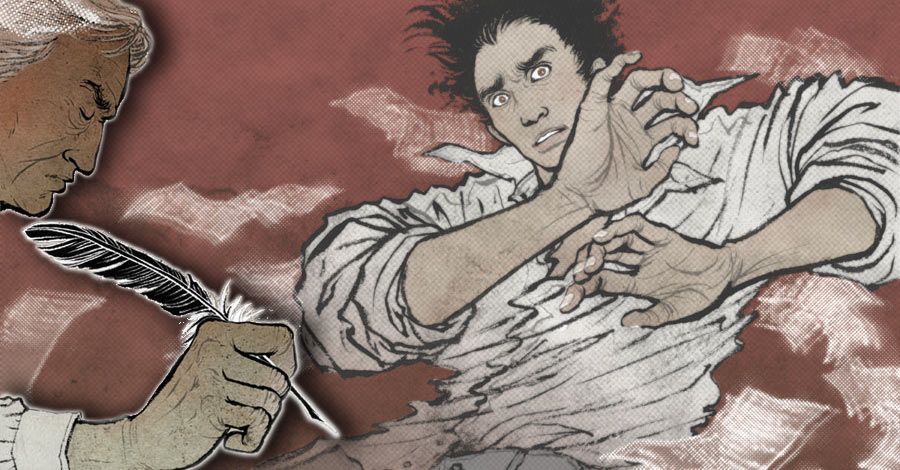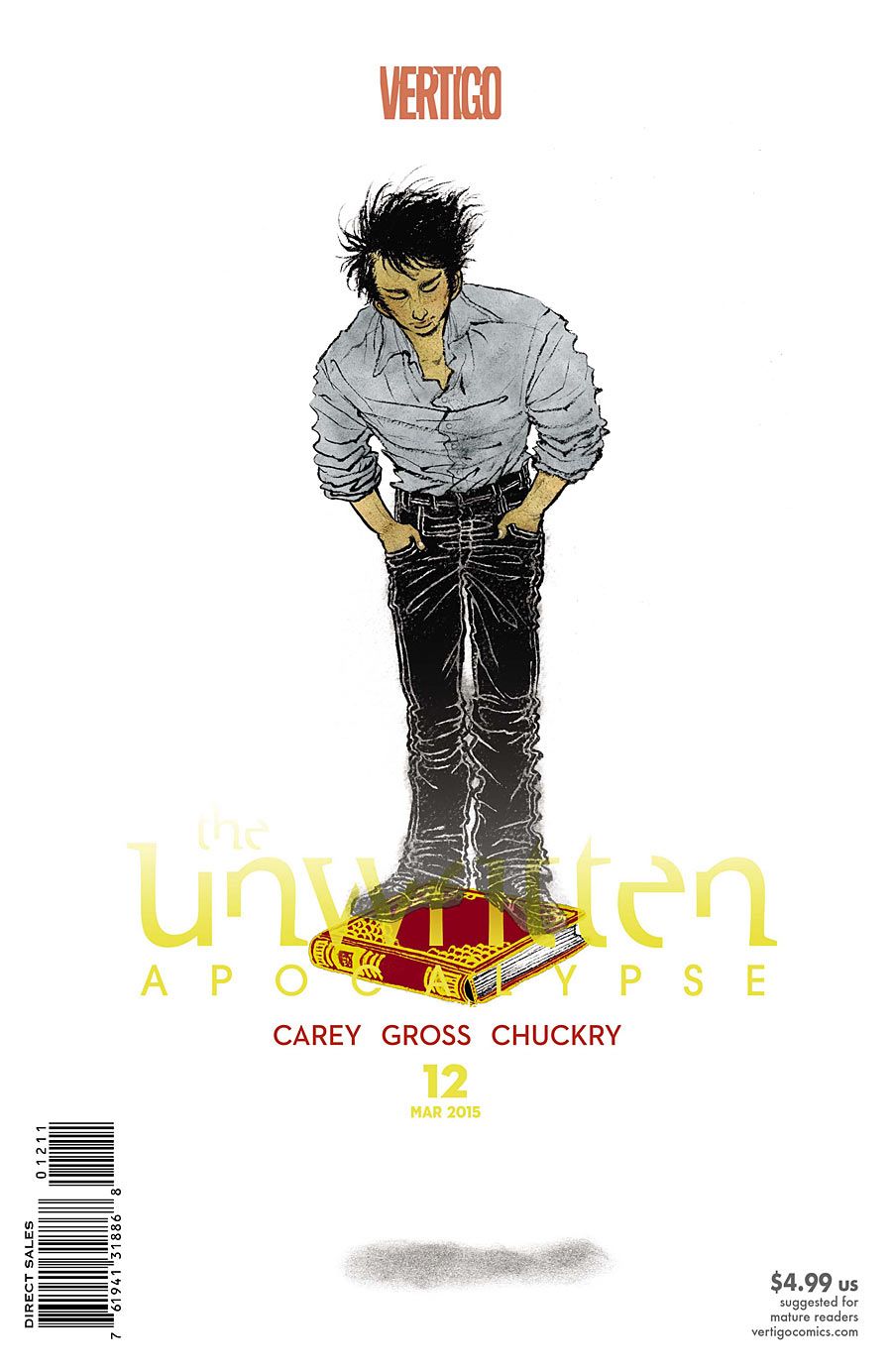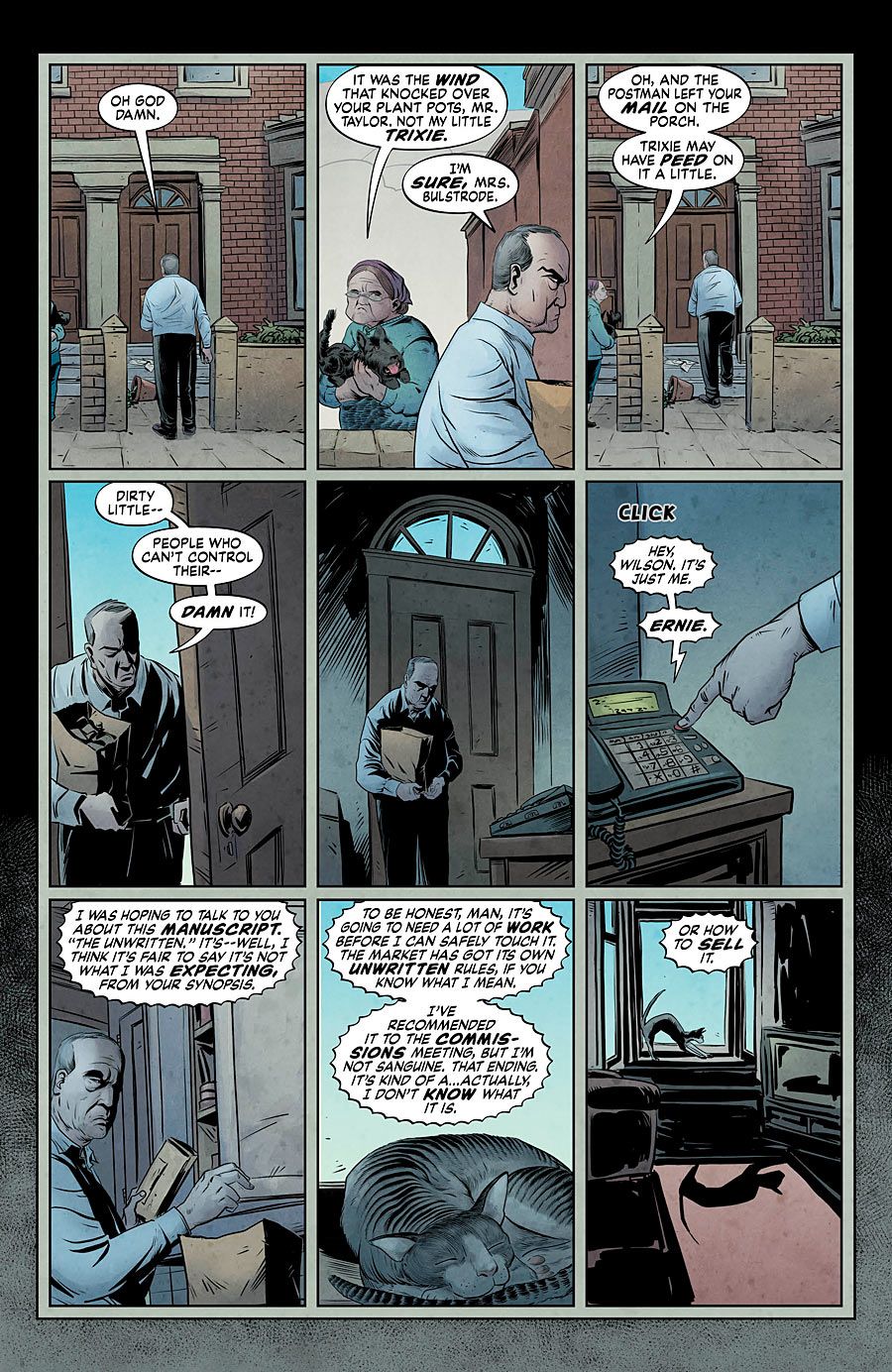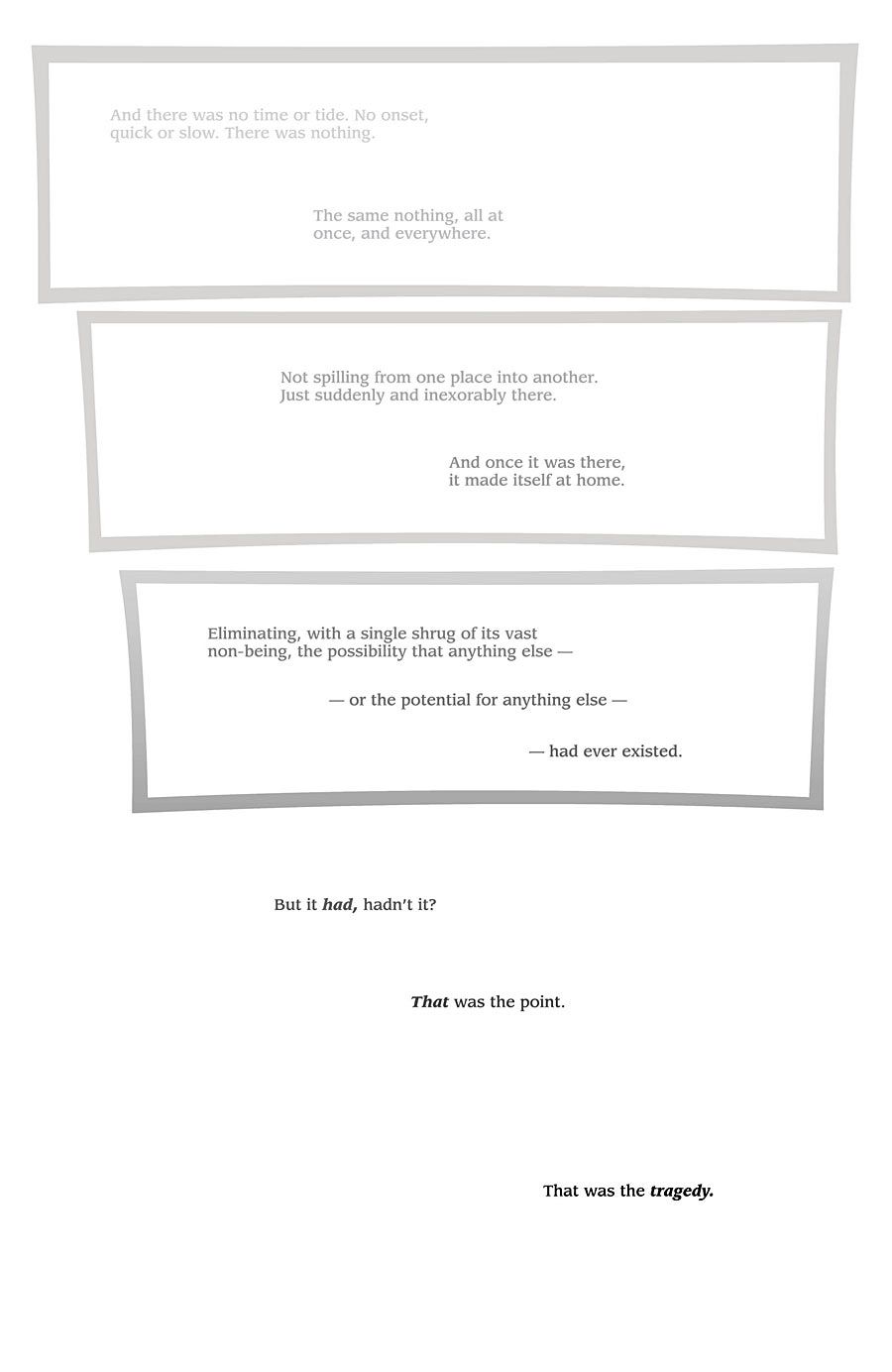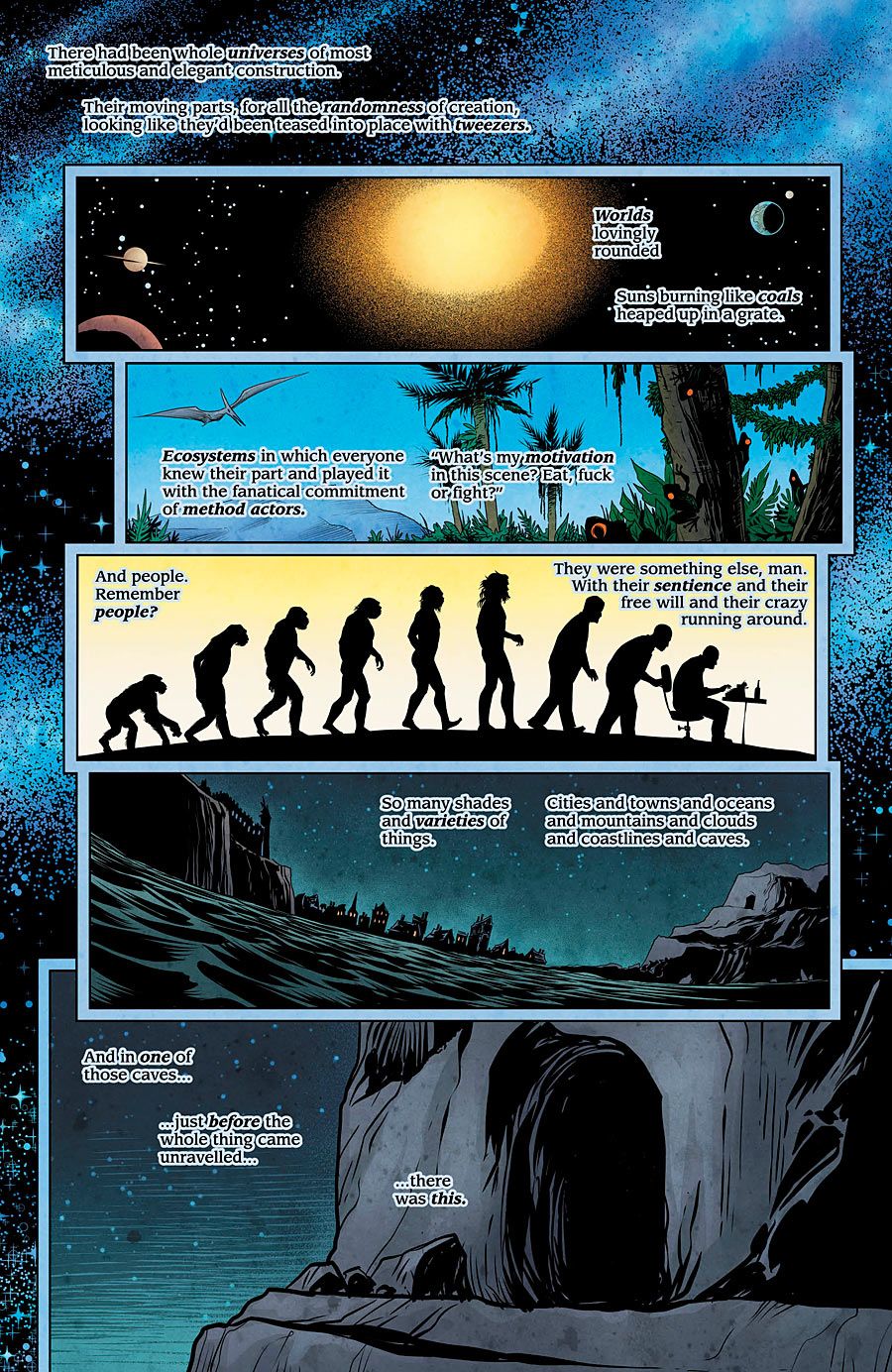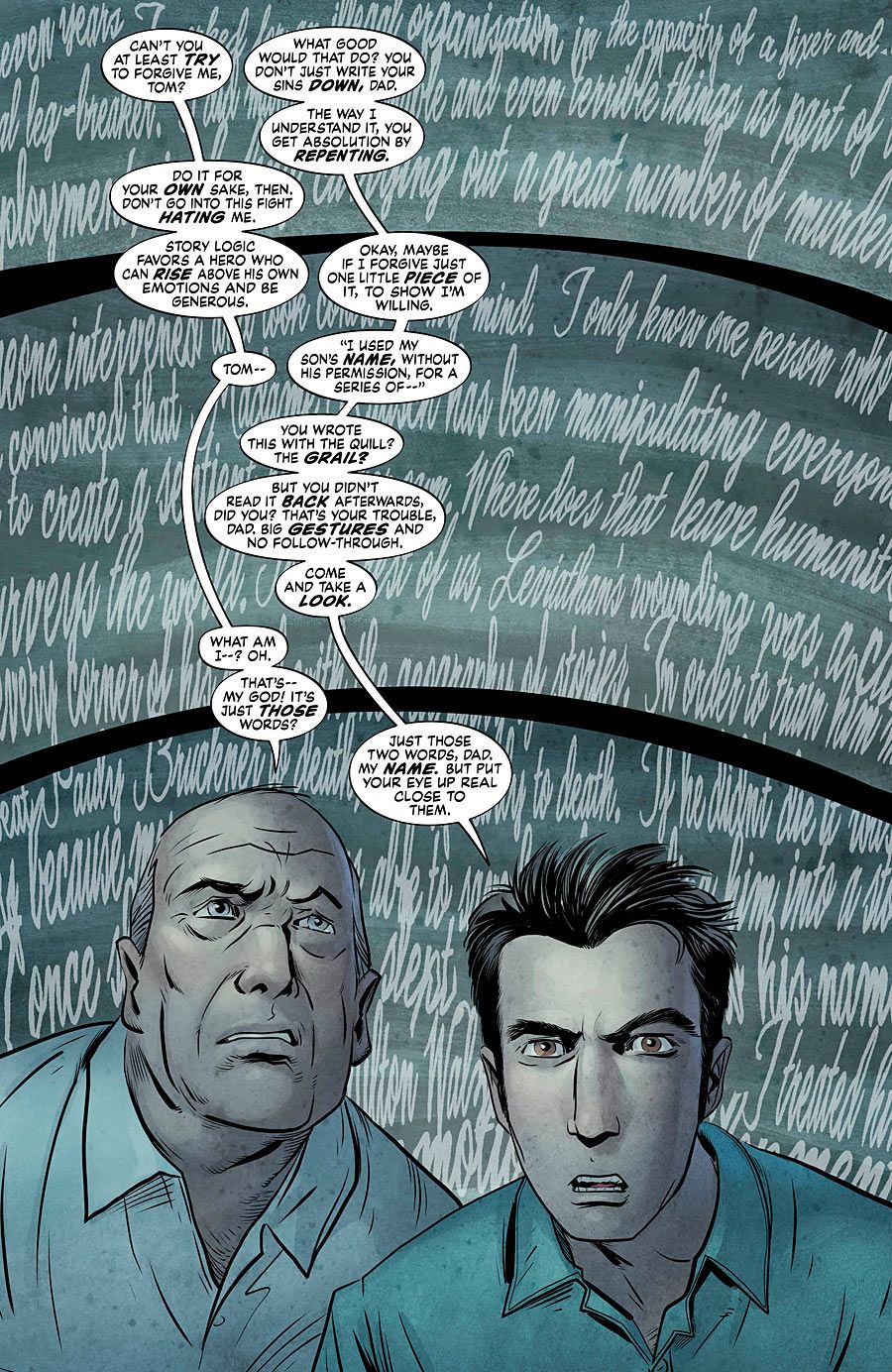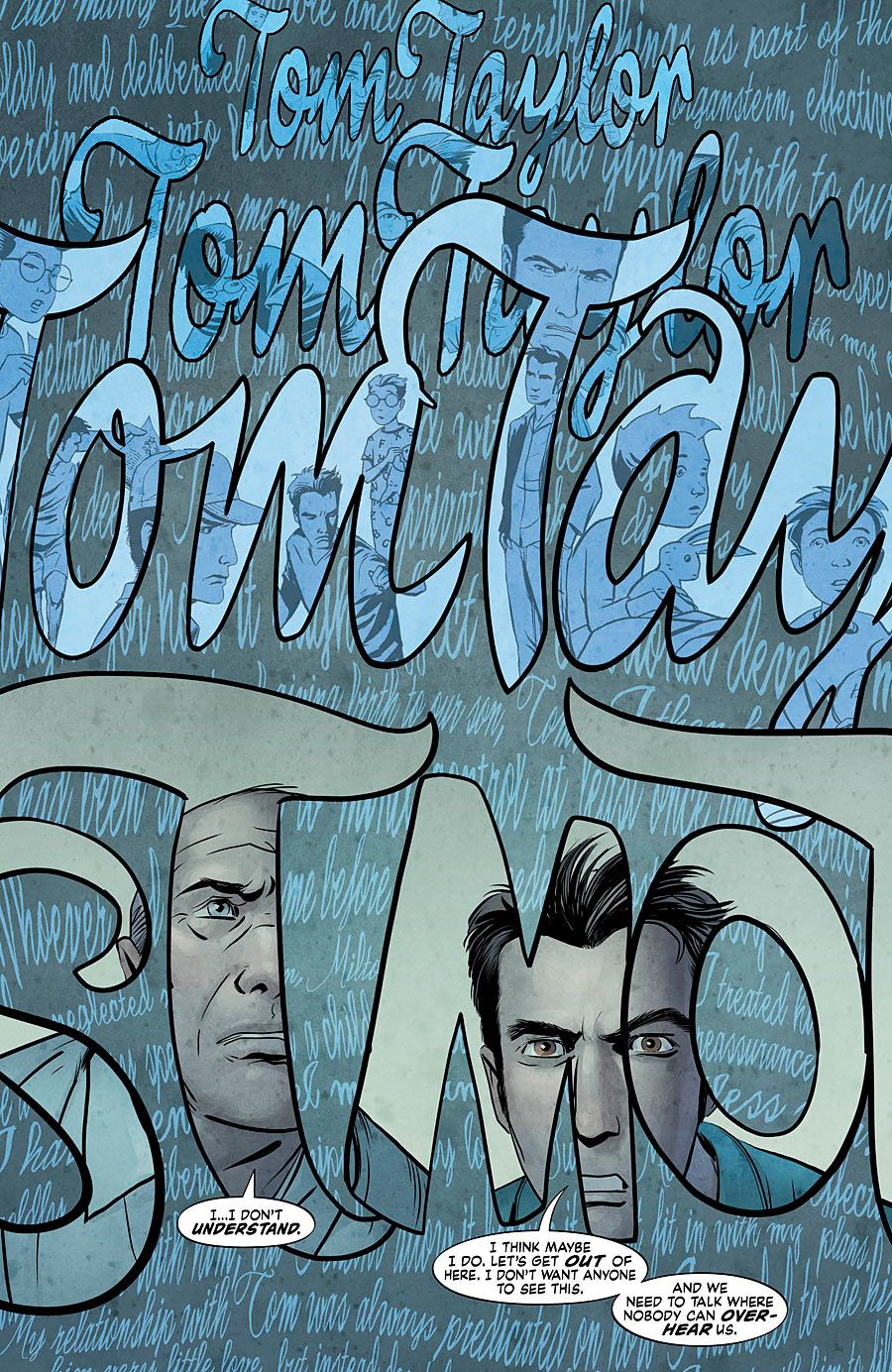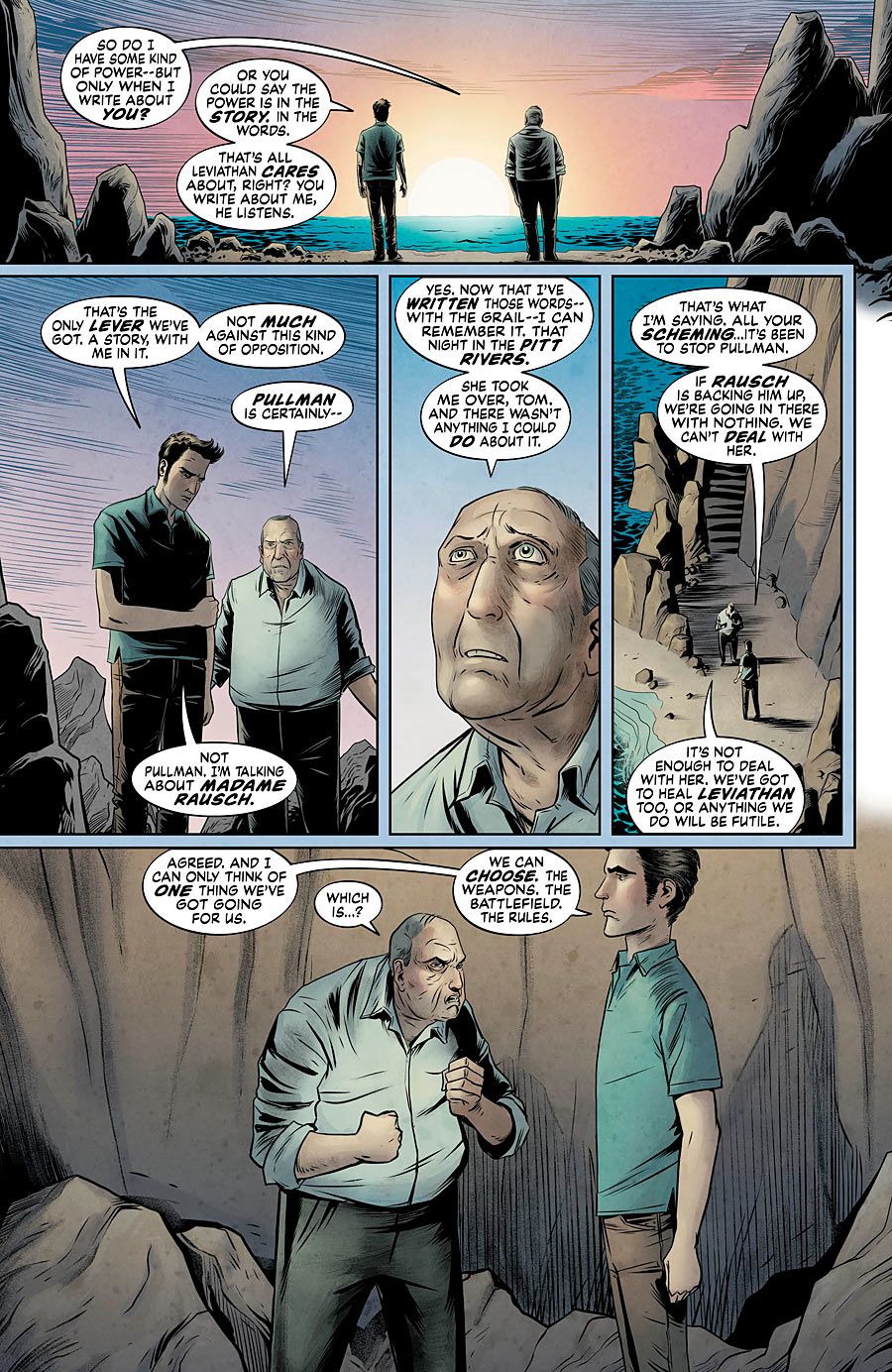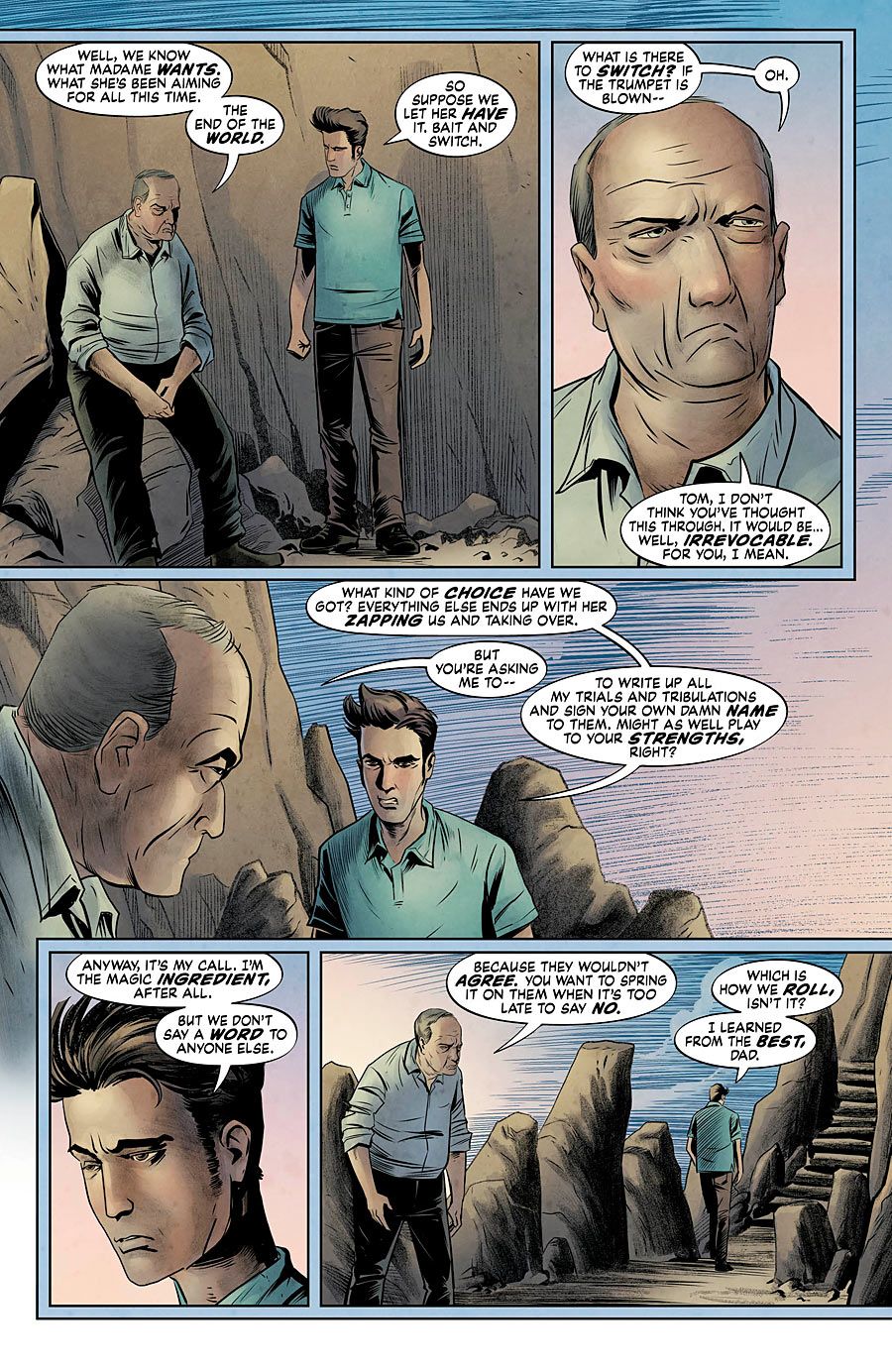[SPOILER WARNING: This article contains major spoilers for "The Unwritten: Apocalypse" #12, on sale now.]
Over the past five-plus years, modern masters Mike Carey and Peter Gross have highly engaged readers with their Eisner Award-nominated series, "The Unwritten." Published by DC's Vertigo imprint, Tom Taylor's journey through stories (and exploration of storytelling) has effortlessly mashed nearly every genre possible, bringing characters as far fetching as the Frankenstein Monster and Baron Munchhausen to Pinocchio and Sinbad the Sailor together to a place "not down in any map." But as Herman Melville tells us, true places never are.
But is the story true? That's exactly the theme that drove "The Unwritten" for its first 70 issues (and an original graphic novel), is Tom's story fact or fiction? Or is it somewhere in between, charting the metaphysical waterways from the belly of the beast?
Carey & Gross Ready the End of "The Unwritten: Apocalypse"
All was revealed this week in "The Unwritten: Apocalypse" #12, which featured a superbly crafted cover by Yuko Shimizu, as Carey and Gross told the last chapter of a series so relentlessly ambitious, it would have made Captain Ahab proud.
To mark the occasion, CBR News connected with Carey and Gross for one final conversation about "The Unwritten" and with topics ranging from redemption and sacrifice to resurrection and Ron Swanson's misunderstanding of metaphors, discovered that literally and figuratively we all collaborate in the creation of reality. It's just a story that we're all making up as we go along.
CBR News: It is unbelievable to me that we first talked about this series almost six years ago back in 2009. And we've talked about it, by my count, 12 times since then. I went back and checked my first question from 2009 and I think it is a good place to begin this final interview.
Let's start at the beginning. How did "The Unwritten" come about?
Mike Carey: Doesn't that seem like a long time ago? First and foremost, we really wanted to get another book going. We had a blast working together on "Lucifer." We'd done a lot of pitching but nothing had quite stuck. And then we were brainstorming ideas at San Diego with [former Vertigo editor] Pornsak Pichetshote and he said, at a really critical moment, "Don't let the conversation stop." And when we all got home, Peter had an idea and I had an idea and we rolled them together and turned them into what became "The Unwritten."
Peter Gross: Mike suggested that we each put an idea out there and we both did. [Laughs] And there was just uneasiness. We each thought our idea was the better idea. And I said, "It's a shame that we can't combine these two ideas." And then we realized that we could. And that's what we did.
Carey: Peter's idea was about following the same character in real life and in a fictionalized version of their life. And originally, it was going to be about a young girl. But the idea of the parent being the writer was already in there. And my idea, which turned out to be a much smaller part of the whole, was about the magic trumpet, which in Hindu mythology signals the end of one age of the Earth and the start of a new age.
COMMENTARY TRACK: Carey & Gross on "The Unwritten: Apocalypse" #1
Gross: But that did end up being a huge part of the conclusion.
Carey: Yes, it did become the big MacGuffin in the climax.
Gross: And we also had the idea of unmaking the world.
Carey: And there was always the idea that it would be a story about story. And we would bring together the stories that we both loved.
And how did it end?
Carey: It ends by resolving, forever and definitively, the question of whether Tom is a real boy or a puppet. Whether he's fictional or actual. It resolves that question in a way that hopefully readers did not see coming. That was the existential riddle that we posed in the first issue and it's the final seed of the conclusion.
Gross: And while we posed that question at the beginning, the series wasn't really about that. The hook that brought you in to the book was whether Tom was real or not real. But the story was really about whether stories are real or not. In the end, we returned to the question about Tom and I hope it's a satisfying ending.
And indeed it was. And to go back to whether stories are real or not, wasn't your original title "Faction?"
Carey: Yes, it was. That was the original working title and remained the title and it lasted right up until Peter was drawing the first issue. I am looking at the pages right now and they have "Faction" crossed out and now have "The Unwritten" on them. That was the conceptual heart of the book -- the idea that we all collaborate in the creation of reality. It's a story that we're all making up as we go along.
Gross: And I think the whole series was exploration of that idea. I don't think we knew how powerful an idea that was going to be. Or what it really meant. And I think we had a unique opportunity in the series to experience and explore the idea personally. I hope it showed in the work.
Carey: It did keep surprising us in terms of the work. Looking at that theme opened so many different doors.
Like Lizzie, who slips every so often, do you call your main character Tom or Tommy when you're discussing him?
Carey: We keep up the distinction. Tom is the son of Wilson Taylor and Tommy is the character in the books. And, at least to me, they are two distinct entities. Although I did really enjoy writing the few times that they did interact with each other.
Gross: And I think one thing that remained consistent through the series is that Tom never wavered in his belief that he was Tom. He always refuted that he was Tommy.
Carey: Which kind of lends a tragic dimension to the way he finally defeats the opposition.
Gross: He's still Tom but maybe Tom isn't exactly what he thought. [Laughs]
In the end, Tom makes the ultimate sacrifice, taking Pullman and Rausch along with him. And with that, the story literally swallowed the questing knight and the ultimate villain. If Tom is "the questing knight" and Pullman is "the ultimate villain," what did Madame Rausch represent?
Carey: There is an exchange between Tom and Rausch, where she says, "This is my power. You've stolen it." And he says, "Not really. But it's true that you're the puppet now, rather than the puppeteer." If you go back to "The Unwritten" #33.5, which featured her origin in the story, "From the Lives of the Marionettes," she is somebody that was horrendously abused as a child and robbed of all agency and reduced to a play-thing by her own parent. But she managed to completely turn the situation around and escape from those constraints to actually amass power and become the ultimate manipulator, the ultimate puppeteer. She becomes somebody who basically only has instrumental relationships with people. She never opens up to people. She only uses them. In that respect, she's kind of a counter to Wilson. What Wilson was to Tom, Rausch was to everybody she ever encountered.
She has walked the Möbius strip for a long time and in the end, she is back at her own starting point. She is trapped in somebody else's story and unable to make her own.
Gross: And I agree that she is a parallel to Wilson. And at the same time, Pullman is almost like a twin of Tom. Pullman could have been Tom if he was a little less stubborn or a little more able to believe in story. Tom and Pullman are like twin brothers that have gone different ways in the story.
And the big question is, who was the big villain? Was it Rausch or Pullman?
Or as we've discussed, was it Wilson. Though in this final arc, he was given a slight reprieve by Tom, though maybe not by Pauly Bruckner. And I guess, technically, like Tom, I don't hate him anymore.
Carey: [Laughs] You're right. We do give Wilson a certain amount of redemption. And we give Tom the last word when he says, "You spent your whole life doing bad shit to buy off the worse shit you'd already done." I don't hate you anymore for that. Which is really all of the forgiveness and all of the redemption that Wilson deserves.
I actually laughed out loud when Pauly gave him the kick in the rear though the gate.
Carey: That was all Peter. [Laughs]
Gross: That was me being Pauly. And Wilson being Mike. [Laughs]
Carey: Yes. But all joking aside, and we have discussed this at length before, this has been a very collaborative series. I feel we truly broke down some of the traditional roles of writer and artist, although I never drew a picture, but it was never truer than for this final issue. There are so many things that weren't in the original script. This issue truly grew as we discussed it with Greg [Lockard], our editor. As Peter was doing the layout and even the finished art, it just kept growing and changing the whole time. It's the most organic issue of anything that I have ever written.
Gross: The difference from the first script to the final issue was huge.
And you know what, that truly comes as no surprise. It read that way. Like Leviathan, the story needed to be fed and fed. And I know it's hard to stick the landing, but for my money, you nailed it. We've talked about Wilson and Pullman and Rausch and Pauly, but ultimately, the one doing the most damage was Leviathan in the form of Moby Dick. Did you always know that you would come back to the great white whale?
Carey: I'm going to the fess up here and tell you that in the original script, we weren't going to come back to Melville. I wrote that scene set on the Demeter, which is the ship from our graphic novel, "Tommy Taylor and the Ship that Sank Twice." It was Peter who said we really need to go back to the Pequod. And it was a great call. A lot of great things sprang from that decision.
Gross: Although, we talked many times along the way about revisiting the Pequod, especially after we did the first Leviathan arc and Tom ended up in the belly of Moby Dick. We talked about going back to that story numerous times. We even talked about going back to it in cycles in different ways. But we obviously ended up not doing that. We talked about Tom coming back each time as a different character in the story. And ultimately, he'd be Ahab at the ending.
Carey: We had to bring Leviathan back. We had to heal Leviathan. The healing of that wound was a very important theme so going back to "Moby Dick" was the perfect setting for that scene.
NYCC EXCLUSIVE: Carey & Gross Announce "The Unwritten: Apocalypse"
Gross: And we tried to suggest in the last issue by going back to it that one of the reasons "Moby Dick" exists is almost to serve as a place where Leviathan can be healed over and over again. Mike put a great line in there: "[It's] the only story where the whale wins." There is almost a metaphysical reason for Moby Dick to exist in the pantheon of literature.
Carey: The day that we received the final PDF to read through, I was watching the "Parks and Recreation" episode, in which Ron Swanson is talking about "Moby Dick." He said, "I hate metaphors. That's why my favorite book is 'Moby Dick.' It's just a good, simple take about a man who hates an animal." [Laughs]
A favorite sequence of mine was the return of Claude-Louis Chadron. And of course, Pauly Bruckner had an awesome ending too. Was it sad saying "goodbye" to these characters as the story came to a close?
Carey: It's always bittersweet. I always go back to "Lucifer" and I remember in the original plan, it ended with "Lucifer" #69. It ended at the end of the war in the "Morningstar" arc. And it was Shelly Bond, who was our editor, who said," You may want to spend a little time saying goodbye to these characters, who you have lived with for six or seven years." And we ended up doing half-a-dozen issues that were all in their different ways codas for the different characters' farewell. Obviously, we had to do that in a more truncated way here but it was important for us to touch base with all of those characters and to give readers a sense of where they end up whether they have happy endings or not.
Gross: And I think we even cheated a bit this time. We discussed that Richie's happy ending was not consistent with the logic of the story. [Laughs] But he got such a great moment and he deserved it so we decided to just give it to him. It didn't matter. But it absolutely breaks our story logic a little bit.
Carey: But the story logic has become story logic in a different sense because it's Wilson, who gets to decide how everybody ends up. He doesn't have to follow any rules.
And what about Wilson? As I mentioned, in the end, you were able to lift my hatred towards Wilson Taylor to a level of in the range of mild acceptance. And we have acknowledged that perhaps he too was more victim than villain. But as storytellers, what did his journey as the master puppeteer mean to you as creators?
Carey: That's a good question.
Gross: We did not intend to redeem him. The story turned that way during the "Apocalypse" arc when Mike flashed to the 1930s and his encounter with Pullman and Rausch. You find out that in the past, Wilson wasn't totally to blame for being an asshole.
Carey: We always knew that he was involved in a war. And it doesn't make him any more likeable as a human being but it allows you to better understand why he did the things that he did. He did such awful things to people that he ostensibly loved. But we never talked about it as redemption.
Gross: No, but this way it gives him a little bit of an out. And now we have completely strayed from your question. [Laughs]
Carey: It's true, to go back to your original question, that the relationship between the storyteller and the story is a little bit like a torturer to a victim. It's a metaphor that Gene Wolfe uses in "The Book of the New Sun." You create these hopefully believable relatable characters and then you put them through these really dramatic and terrible experiences. And you have to sympathize with them. You have to be in their head space. At the same time, you have to be detached enough to say, "It would be great if he lost an arm at this point." [Laughs] Wilson is the embodiment of that.
In the end, Wilson is seen descending down a tunnel, presumably into the story -- perhaps leaving the door open for a return. Would you ever return to "The Unwritten?"
Carey: I think we would love to return to some of the themes and some of the characters but I think that [an] ending is an ending. There are other ways to come at it perhaps.
Gross: I think there are stories within what we did that we would love to explore further but I don't know if there is a story after what we did. I was sad that we didn't have a moment with the Tinker.
Put me down for a Pauly Bruckner ongoing series. If not more of "The Unwritten," will you work together again?
Carey: Damn straight. I can't put words in Peter's mouth but I would love to work with Peter again. The best work I have ever done has been with Peter.
Gross: If Mike can put up with me questioning everything that he writes along the way, I would be more than happy to work with him again.
Vertigo's "The Unwritten: Apocalypse" #12 by Mike Carey and Peter Gross is available now.

